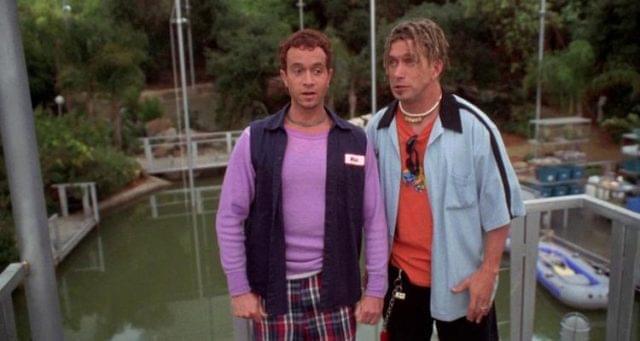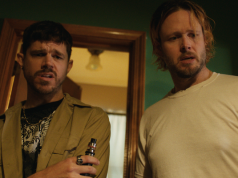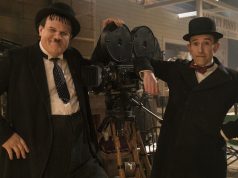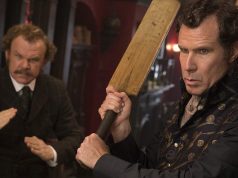
Pauly Shore’s parents were Mitzi and Sammy Shore, showbiz pros who founded The Comedy Store, L.A.’s famous stand-up club, in 1972. Those connections explain how Pauly was able to get his first job in entertainment. But nothing can account for his continued employment, or for the movie “Bio-Dome,” which is — and I do not make this assertion lightly — the worst crime ever perpetrated against humanity throughout all of recorded history.
I apologize. I actually do make that assertion lightly. I do it all the time, in fact. I am like the title character in the children’s story “The Boy Who Cried ‘Worst Crime Ever Perpetrated Against Humanity Throughout All of Recorded History.'” But “Bio-Dome” really is quite bad, certainly one of the worst comedies I’ve ever seen, and I speak as one who has seen the entire output of Martin Lawrence. I had trouble getting through it on DVD. I can only imagine the trauma of seeing it in a theater, engulfed by the giant screen and stereo sound system. It gives me newfound respect for the trailblazing movie critics who had to endure it that way, back in 1996.
The film is a transparent attempt to capitalize on the success of “Dumb & Dumber,” which had proven, in 1994, that comic duos in movies didn’t have to consist of one smart guy and one idiot (nor of one fat guy and one thin guy, though that’s not germane to the present discussion). They could both be idiots, and that way the screenwriter didn’t have to worry about coming up with smart dialogue for anyone. The trouble with writing smart characters, of course, is that the writer has to be smart, too. But anyone can write dumb guys.
In “Bio-Dome,” the two idiots are Bud (Pauly Shore) and Doyle (Stephen Baldwin), lifelong friends who are now roommates, partners in crime, and possibly lovers. They have girlfriends, but I’m pretty sure they’re also “on the down low,” if you know what I mean. They cuddle up together when they sleep, they always stand very close to one another, and one will put his arm around the other’s waist or a hand on his arm when they’re talking. There is also the matter of Bud’s lilting, effeminate manner of speech, though I think that’s just Pauly Shore. They frequently speak in unison in a campy manner. But the smoking gun (as it were): When Doyle makes a reference to being really good at masturbation, Bud confirms that this is true. Then he laughs, as if to say, “Nah, just kidding, how would I know?,” but it’s too late. Their secret is out.
This brazen bisexuality, still bold in 1996, is the only interesting thing about the movie, which is sad, considering I’m probably making it up. Otherwise, it’s your typical “morons get involved in something over their heads and wreak havoc” comedy, similar to “Tommy Boy” or the Vietnam War. Bud and Doyle are driving through the Arizona desert when they pass a bio-dome facility that scientists are planning to live in for a year. For some reason, Bud and Doyle think the bio-dome is a mall, and they stop there to use the bathroom. (Bud sits next to Doyle and watches as Doyle pees in the bushes.) Then they wander into the actual bio-dome habitat and are there when the scientists seal the doors. To unseal the doors and let the idiots out would ruin the delicate balance of blah blah and ruin the experiment and yada yada, and so they’ll have to stay for the year.
At this point, you would expect the film to implode from the sheer force of its own stupidity. Yet somehow it continues.
The team of scientists is led by a grumpy man with ulterior (and boring) motives, Faulkner (William Atherton). He’s joined by two hot lady scientists, a nerdy entomologist, and maybe some others. Seems like there were others. I dunno. Bud and Doyle flirt harmlessly with the hot lady scientists, then chicken out when the ladies finally succumb to their advances. They cite their ongoing relationships with girlfriends back in the real world as the reason, but of course I am skeptical.
While the scientists are doing their experiments and research, Bud and Doyle are left to their own devices, which means they relentlessly destroy everything they touch. When the insect guy shows them two very rare butterflies that he’s studying in the lab, it’s inevitable that Bud and Doyle will accidentally release them. The amazing part is that the film isn’t setting it up for a later payoff; the guys set the butterflies free in that very scene, with the words of caution barely out of the scientist’s mouth. Then, feeling guilty, they try to recapture the insects by putting up a tarp-sized wall of flypaper, which captures them but also kills them. This is stupid of them, but no stupider than the scientists including a tarp-sized wall of flypaper in their bio-dome supplies in the first place.
Bud and Doyle’s gleeful idiocy is so relentless that I began to wonder if they were being annoying intentionally. Some of their behavior is so clueless, so obviously ill-conceived, that they’d have to be doing it on purpose. And yet they remain oblivious to their destructive tendencies — until the film’s last act, when they suddenly are very smart and conscientious and set out to save the bio-dome environment they have ruined. When they succeed in turning things around, they are hailed as heroes, even though they were merely fixing what they’d wrecked in the first place. Since when do we praise anyone over the age of 5 for cleaning up their own messes?
A great deal of the film’s attempted humor revolves around Pauly Shore’s unique personality and attitude. (If the preceding sentence were an algebra problem, you would determine that unique=irritating and make the appropriate substitutions.) Little effort is made to provide him with dialogue that is funny on its own — which means if you don’t like Pauly Shore’s style, you’ll have nothing to laugh at.
That’s the boat I’m in. The S.S. Doesn’t Think Pauly Shore Is Funny. His first appearance in the film is a scene in which Bud and Doyle are deciding which of them will injure himself in order to get out of attending an Earth Day neighborhood clean-up party with their girlfriends. (Bud winds up hitting Doyle in the head with a heavy book, which causes Doyle to fly through the air into a bookcase, whereupon we hear “tweeting birds” sound effects. No, this is not an animated film.) The minute Shore opened his mouth and began to speak in that quasi-surfer-dude-lazy-California-self-aware-trying-too-hard-to-be-cool voice of his, I was annoyed. And I thought: Oh. He’s going to talk like that through the whole movie, isn’t he?
And why shouldn’t he? The fans who made him such a success — whoever these mythical people are — went to see “Bio-Dome” with the expectation that Pauly Shore would continue to be the same unfunny one-trick pony they’d come to know and love. If he had dropped the act and played a real character, the fans would have been outraged. “We no like different Pauly!” they would have grunted at the box office personnel. “We want money return! Movie bad!” This would have spelled disaster for the movie’s financial prospects, and its failure would have been a major setback for the gay film movement. Thank goodness Pauly stuck to his routine.
— Film.com





